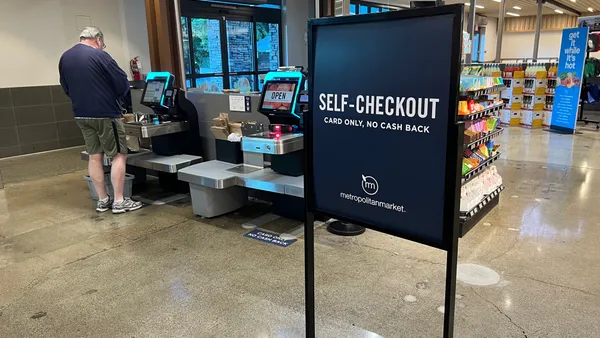Dive Brief:
- Flexible work schedules may be key to attracting and retaining seasonal workers in the retail industry, according to a new report by ManpowerGroup Solutions and the Retail Industry Leaders Association.
- According to the report, retail employers are sharing talent pools and leveraging on-demand scheduling apps that allow workers to choose schedules flexibly. Employers can choose from a variety of smartphone apps and platforms in order to allow for greater flexibility, a statement announcing the report said.
- "Employers across the U.S. are experiencing talent shortages and retailers are not immune as they compete for workers who seek new ways of working," Melissa Hassett, vice president of client delivery at ManpowerGroup Solutions, said in the statement. "Retail workers, from delivery drivers to customer service representatives, want work that can easily blend with their busy lives. Retailers who offer workers flexibility and use technology to recruit talent when and where they want to work will have the edge."
Dive Insight:
Retailers forecast robust holiday hiring in 2019 in order to keep up with consumer demand. This wave of hiring is already well underway. Several retailers announced hiring plans earlier this year: Target in September announced it planned to hire 130,000 seasonal employees this year, with 8,000 of those workers to be used in distribution operations; Kohl's said it planned to hire 90,000 seasonal associates; and Macy's planned to hire roughly 80,000 seasonal workers for its namesake and Bloomingdale's stores.
But hiring may have started even sooner than that: A report released in September by on-demand staffing platform Wonolo showed seasonal hiring began in August. Retailers are also expected to raise hourly wages to attract and retain applicants in a competitive, employee-driven market.
Seasonal workers are increasingly looking for employers who can provide them with flexible options. In fact, one survey released in October found that flexible schedules — alongside higher available hours — were more popular with prospective seasonal workers than higher pay.
Both employers and job candidates might need to be wary of scammers during this time of the year. According to data from the Better Business Bureau's Scam Tracker, North Americans reported more than 3,000 employment scams between January and October 2018, leading to a loss of more than $3 million. Scammers trick job seekers by posting job ads with vague titles or descriptions. The ads usually advertise jobs that require little to no prior experience, making them attractive to applicants. In the process, scammers trick job seekers into giving them personal information and money. Employers can be proactive around this issue by making their ads transparent and clearly outlining requirements and responsibilities — and by making it clear that no money exchange is involved.















